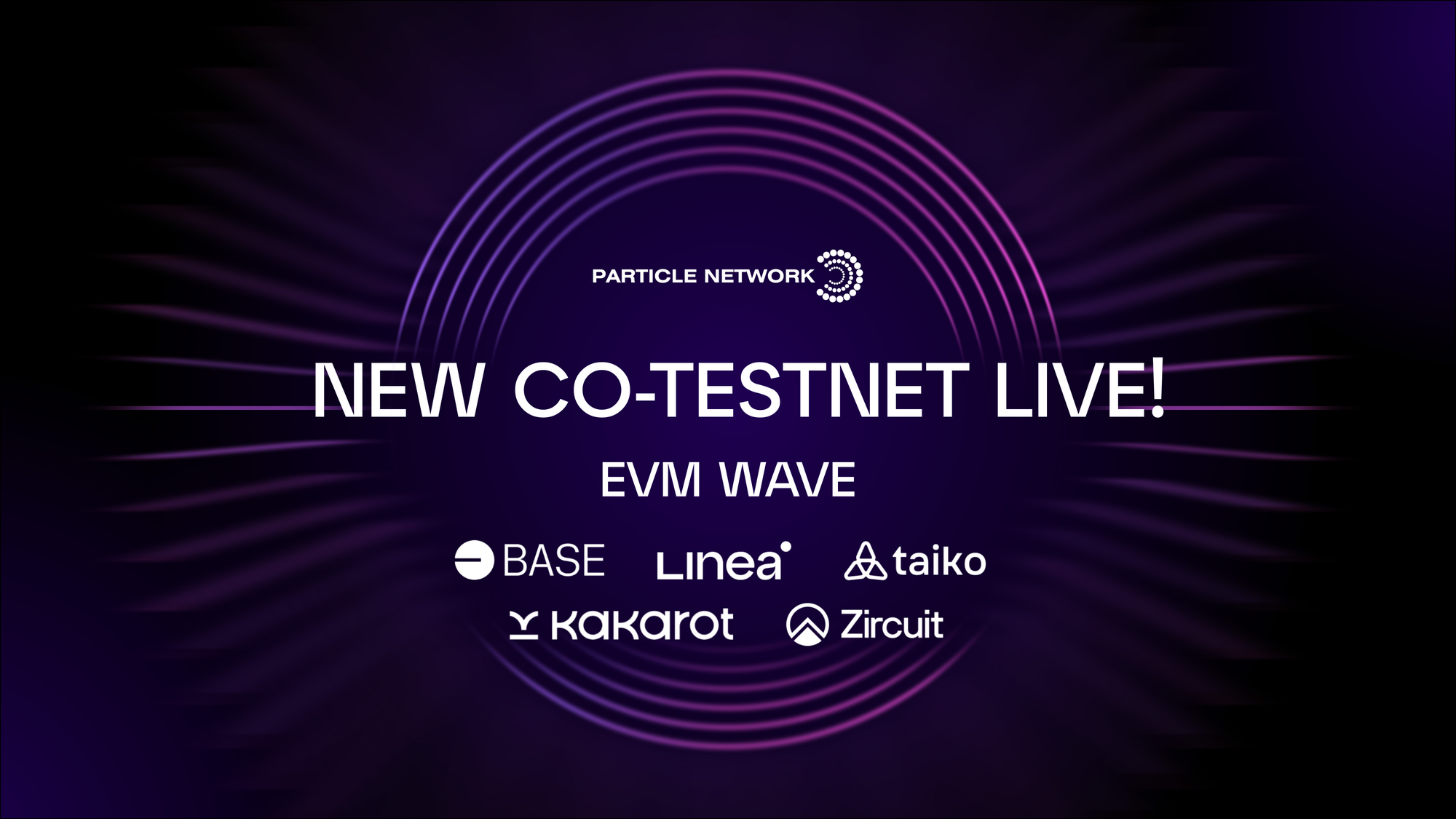Chain Abstraction Coalition: The Second Wave of Co-Testnets Is Now Live on Particle Pioneer!

Table of Contents:
We recently announced the Chain Abstraction Coalition, bringing together major players in the Web3 space to address our ecosystem’s fragmentation.
This coalition, comprised of 60+ leading networks like Arbitrum, Avalanche, Berachain, Botanix, BNB Chain, and Linea, is dedicated to fostering a borderless Web3 ecosystem. The first step of this effort is the introduction of Co-Testnets: special environments demonstrating the capabilities of chain abstraction through Particle Network's Universal Accounts.
After a successful first Co-Testnet Wave, we’re excited to announce a new Wave of Co-Testnets with five EVM chains: Base, Linea, Taiko, Kakarot and Zircuit.
This article will go into how this Co-Testnet works, the incentives allocated by Particle Network towards it, and how this helps you immerse yourself in chain abstraction. It’ll also explain how the latest functionalities introduced in this Wave will give you a glimpse into Web3s future.
So, without further ado…
Introducing the EVM Wave of chains

Before uncovering the details and unique experiences this Co-Testnet Wave offers, let's briefly visit the five next-gen EVM blockchains joining our second Co-Testnet Wave:
- Base is an Ethereum Layer 2 (L2) chain developed in collaboration with Optimism and incubated within Coinbase, offering a secure, low-cost, and developer-friendly platform for building on-chain applications. It is built on OP Stack and leverages Ethereum's security, allowing developers and users to enjoy seamless Coinbase product integrations, easy fiat onramps, and powerful acquisition tools.
- Linea is built on top of Ethereum, providing the security of the Ethereum blockchain, while also delivering unrivaled scalability using type 2 zkEVM validity rollup. Linea allows you to deploy any smart contract, use any tool, and develop as if you’re building on Ethereum. For users, this enables the experience and security guarantees of Ethereum, but with lower transaction costs.
- Taiko is a highly configurable, fully open-source, and permissionless EVM rollup designed to make Ethereum more affordable while preserving its core values of censorship resistance, security, and decentralization. As a based rollup, the transaction sequencing on Taiko is done by Ethereum validators, inheriting the L1s liveness and credible neutrality. With a focus on community collaboration and security, Taiko aims to enhance Ethereum's scalability without compromising on its fundamental principles.
- Kakarot is a zkEVM built in Cairo, the provable language that powers Starknet and all the StarknetOS chains (also called CairoVM chains, or Starknet appchains). Kakarot is an Ethereum-compatible zkRollup Layer 2. Beyond compatibility, Kakarot strives to push more innovations to the L2 space, and to add new features such as native account abstraction to the EVM. Kakarot's driving ethos is to “Prove, Scale and Innovate.”
- Zircuit is a fully EVM-compatible zero-knowledge rollup powering the limitless potential of web3. Backed by pioneering L2 research, the network’s unique hybrid architecture combines battle-tested infrastructure with zero-knowledge proofs to give developers the best of both worlds. With cutting-edge performance and security at the sequencer level, users can explore new frontiers with faster transactions, reduced fees, and complete peace of mind.
How does this Co-Testnet work?
Particle Pioneer and Universal Accounts
Co-Testnets are hosted within Particle Pioneer, our Testnet platform where users can explore a borderless Web3 through chain abstraction (ChA).
Within Particle Pioneer, we’re constantly integrating new chains and ChA functionalities, which rely on Particle Network’s Universal Accounts. These accounts, which you can create via a wallet or social login, allow you to interact with all chains as if they were a single network, with a single balance and address across them and seamless interconnectivity.
This Co-Testnet wave allows you to go through a borderless Web3 experience with two core tasks: purchasing NFTs across chains and sending cross-chain transactions. Next, we’ll explain how to interact with Particle Pioneer and perform these tasks.
Interacting with Particle Pioneer and Universal Accounts

To start using Particle Pioneer:
- Go to pioneer.particle.network.
- Go through a basic registration process and connect a wallet or social account to create a Universal Account. From now on, your connected wallet or social account will be your login into your Universal Account. Importantly, new users who connect wallets from select providers may be eligible for the Bonus Wallet (up to 150%) if they fulfill all the prerequisites. Depending on your connected wallet’s existing activity, you may also be entitled to receive a special OG reward!
- Click on “Points” to land at the Points Dashboard.
- Your Universal Account will be accessible through the bottom right corner button. It will display all your Testnet tokens within a single interface, as shown below.

- Within your Universal Account, you will have a single address for every integrated chain. You can top off your account with assets from any public Faucet (we’ve included links to them in the interface in case you need them!)
- That’s it! You’re now ready to start exploring the Particle Pioneer platform.
Purchasing NFTs across chains
The latest addition to our Co-Testnet is the ability to purchase NFTs on participating chains using assets from any other chain. This showcases the borderless experience enabled by chain abstraction. To start using this functionality:
- Scroll to Task #4 and click “Purchase NFT”
- Select the Testnet chain on which you’d like to purchase an NFT.
- Click “Purchase”.
- Select one or more of your Testnet tokens from any Testnet to pay for the NFT.
- That’s it! That’s how easy it is to leverage chain abstraction and how easy Web3 is about to become thanks to the ability to perform any transaction on any chain through Universal Accounts. This is also demonstrated in the video below:
Purchasing NFTs across chains with Universal Accounts.
Sending cross-chain transactions
You can also earn additional points by sending cross-chain transactions with your Universal Account. With the magic of chain abstraction, this is as simple as sending a regular transaction!
- Click on the “Send” button to initiate a cross-chain transaction. Importantly, to receive the Co-Testnet bonus, you will need to send USDG. If you don't yet have USG, Particle's "Universal Gas" token, you can obtain it by depositing any Testnet asset.
- Select the asset you wish to send by clicking on the menu at the top. You can select the destination chain (use Base Sepolia, Linea Sepolia, Taiko Testnet, Kakarot Sepolia, or Zircuit Testnet for our Co-Testnet bonus!) as well.
- Enter the address you want to send to in the “To” field. Insert the amount that will be sent in the “Amount” field.
- Click “Next” and inspect the details of the transaction. If you’re satisfied, click “Send” and confirm it.
Sending cross-chain transactions to any network with a Universal Account.
- That’s it. You just sent a cross-chain transaction!
For extra points, you can also scroll down the Points dashboard and follow Base, Linea, Taiko, Kakarot and Zircuit on Twitter (X), and go to the Particle Pioneer Booster page to mint a commemorative Booster NFT.
As always, there’s more on the horizon.
The Chain Abstraction Coalition's momentum is undeniable, with our Co-Testnets showcasing what borderless Web3 looks and feels like. Together, we’re redefining what’s achievable and gathering momentum while unifying our ecosystem.
If you’d like to learn more about the technology making all of this possible, we’d love to invite you to explore our dedicated article on Universal Accounts, as well as the rest of the Particle blog!
Web3 fragmentation is coming to an end. ✊
Particle Network's Chain Abstraction solutions are 100% free for developers and teams. By integrating them, you can set your project in a path to leveraging chain abstraction.
About Particle Network

Particle Network powers chain abstraction, addressing Web3's fragmentation of users and liquidity. This is enabled by Particle's Universal Accounts, which give users a unified account and balance across all chains.
Share this article
About the author(s)


